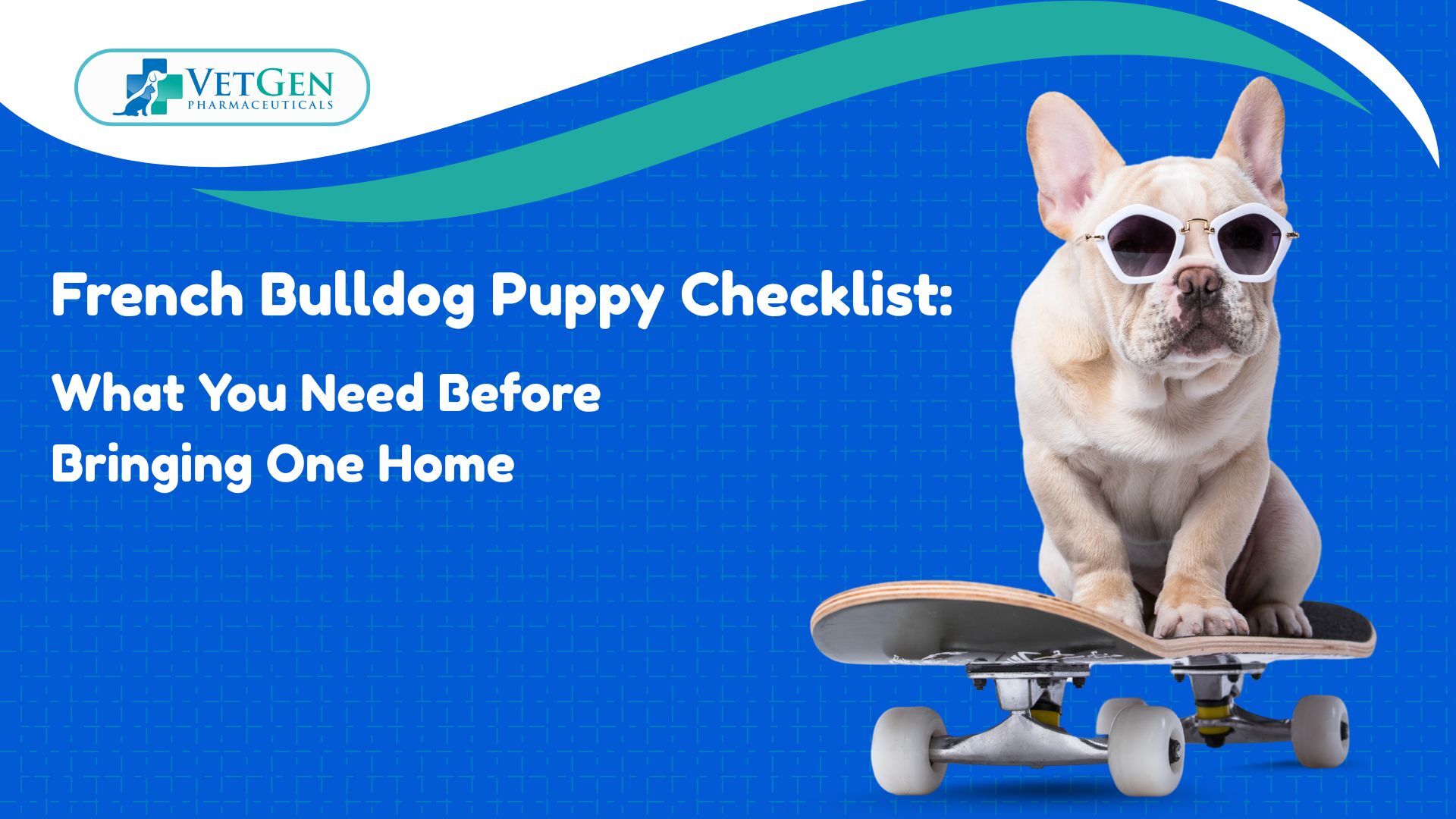The French Bulldog is currently the most popular dog breed in the United States, given their distinctive bat ears, loving nature, and small stature. However, as any new pet owner soon discovers, responsibility accompanies cuteness.
Welcoming a new pet into the family is always a cause for excitement, but preparing for a new puppy can be stressful. If you’re a first-time French Bulldog pawrent, are anxious about how to prepare your home, or are simply interested in learning more about the breed, this blog is the one for you.
French Bulldog Puppy Essentials Checklist
Are you preparing to expand your family with a Frenchie? If so, you might be doing a few things to get your house and yourself ready for your puppy. You should know a fair amount about the Frenchie breed like their attitude, persistence in training and infatuation with their owners before you bring your new pet home.
Research is therefore essential before bringing your dog home. Understand their personality, diet, and playfulness to make sure you’re ready for one.
Here’s a checklist to help you gather all the essentials.
1. The Right Crate or Playpen Setup
French Bulldogs are den animals at heart and feel safe in a snug, well-sized crate. Choose one big enough for your pup to stand, lie down, and turn around comfortably. If it is too big, they might treat it like a two-room flat, one side for sleeping, one for accidents. Crates with dividers are ideal to grow with them, and having a playpen option gives them freedom without total chaos.
2. Quality Puppy Food and Treats
Your puppy’s tummy can be a bit fussy, so choose a high-quality, complete puppy food that’s made for small breeds. Avoid anything with fillers or vague ingredients. Look for clearly labelled protein sources and steer towards grain-free recipes if there’s a sign of allergies.
Keep your dog away from human food, especially chocolate, macadamia nuts, avocados, and saturated snacks.
3. Comfortable Harness and Lead
Due to their brachycephalic (flat-faced) morphology, French Bulldog puppies should not be walked with lead collars. Rather, spend money on a cushioned harness that lessens the strain on their sensitive airways by distributing pressure over the chest. For stability, a Y-shaped front is ideal. They grow like weeds over the first few months, so you have to be flexible.
4. The Appropriate Bowls
French Bulldogs are not ideally suited for eating from standard bowls due to their brachycephalic (flat) facial structure. This anatomy can make using regular bowls challenging, often resulting in behaviors such as snorting, huffing, or awkwardly pushing their entire head into the bowl.
You must use slanted or slightly elevated bowls to enhance comfort and promote healthier eating habits. These designs facilitate easier access to food and help reduce the amount of air the dog inhales while eating, an important factor in minimizing the well-known digestive issues, such as excessive flatulence, common in French Bulldogs.
For durability and hygiene, you must use ceramic or stainless steel bowls. These materials are strong, simple to clean, and resist retaining odors, unlike plastic alternatives.
5. An Early Vet Visit Reservation
Within a few days of bringing your new French Bulldog puppy home, get it examined by a reputable veterinarian. Ask about early indicators of common Frenchie diseases like soft palate or cherry eye, and make sure you understand their vaccine schedule and flea and worm treatments. A vet who is well-versed in the breed is invaluable.
6. Pet’s Insurance
Your French Bulldog puppy must have this. Although it may not be the most thrilling item on the list, this item genuinely saves lives. Frenchies are prone to health problems that can quickly become expensive. Getting insurance early on helps you avoid heartache and expensive expenditures later. Be sure to read the fine print because some policies do not include breed-specific conditions unless they are introduced early.
7. An Abundance of Toys
French Bulldog puppies are active, inquisitive, and teething, so having a good supply of toys is essential. Seek out brain-teaching puzzle games, soft plush toys, and safe chew toys. To keep things interesting and prevent your skirting boards from being chewed to oblivion, rotate the toys.
8. Essential Cleaning Supplies and Puppy Pads
It takes time to potty train a French Bulldog puppy, and an enzyme-based cleanser will be your greatest friend. It eliminates the pheromones that tell your dog that the bathroom is the “toilet zone.” Don’t rely on puppy pads indefinitely, but they can be helpful in the beginning or overnight when you can’t really know when they want to go.
9. A Comfortable Bed and Blanket
Frenchies may look like little tanks, but deep down, they are total softies. Your pup’s first bed should feel like a safe, snug hug. Choose something soft, with raised sides if you can. It helps them feel secure.
Add a cozy blanket, especially one that smells like you or their previous space, if you have it. That familiar scent can ease first-night jitters. Make sure that the bed and blanket are machine washable. Cute as they are, Frenchie pups don’t come house-trained.
10. Prepare for Extremes in Temperature
French Bulldogs aren’t built for extremes. Too hot or too cold, and they’ll let you know. Their little bodies just don’t regulate temperature well. Changes in weather can easily upset their digestive system.
In cooler weather, have a soft jumper or fleece on hand, something that makes those early morning toilet breaks bearable. For summer, a fan in their favourite nap spot or a cooling mat can make a big difference. Keep their space shady, breezy, and chill. Make sure their environment matches their comfort needs, not yours.
Conclusion
The experience of bringing home a French Bulldog puppy is exciting, touching, and sometimes stressful. However, with the right preparation and setup, you’ll be ready for those side-eye looks, zoomies, and cuddles in no time. There’s no turning back once you go Frenchie!
If you want more information about French Bulldogs, their diet, exercise routine, or training tips, visit VetGen Pharmaceutical for expert dog guides.
Frequently Asked Questions
Do Frenchie puppies really need a special kind of bed?
Yes, they do. Frenchies love comfort (almost as much as cuddles). A soft, washable bed with a bit of structure helps them feel safe, especially during those first few nights away from their litter.
What kind of toys are best for French Bulldogs?
Think durable but gentle. Frenchie jaws are strong, but their teeth are sensitive when they’re teething. Soft chew toys, rubber bones, and anything squeaky-but-safe are great picks.
Should I get a harness or a collar?
Go for a harness, especially at first. Frenchies have short necks and can struggle with breathing, so a harness keeps walks safer and more comfortable.
How can I prepare for their food and water needs?
Frenchies can have trouble reaching into deep bowls, so use slightly elevated or angled bowls. Keep bowls of fresh water all around the house to make sure they stay hydrated.
How often should I take my Frenchie puppy to the vet?
Right after bringing your pup home, book a check-up to make sure everything’s on track. After that, your vet will guide you through a schedule of vaccinations, worming, and general health checks. Regular visits early on help your Frenchie stay healthy—and help you catch issues before they become real problems.





